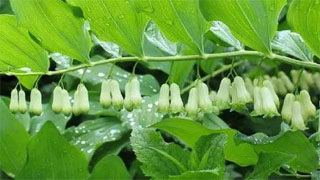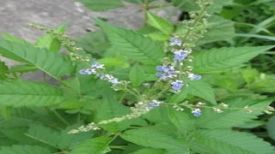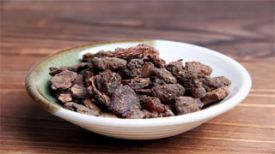
Nickname: Da Huang Jing
Harvesting and processing: Harvested 3 years after planting. Dig up the roots and stems from September to October, remove the stems, wash the mud and sand, remove the fibrous roots and rotten scars, steam until the heart is penetrated, and then sun dry or dry.
Medicinal parts: rhizome
Origin: Yunnan, etc
Family: Liliaceae
Original plant: Dianhuangjing
Plant condition: Perennial herb
The roots and stems are full of vigor and knots. The stem is upright and single.
Leaves 4-6 whorled, linear, 8-13 cm long, 1.5-2 cm wide, apex gradually pointed and curled, base gradually narrowed; No handle.
1-3 flowers axillary; Flower quilt tube shaped, light green, 6-lobed.
Berry spherical, orange red when ripe. The flowering period is from April to May.
Characteristics of Huangjing Dianhuangjing decoction pieces: thick rhizomes, ginger like or bead like, straight to 2-4cm or more, with obvious stem scars on each nodule, disc-shaped, slightly depressed, suitable for 5-8mm; There are many root scars, often protruding, with a suitable diameter of about 2mm. The surface is yellow white to yellow brown, with obvious links and irregular longitudinal wrinkles. Solid in texture, relatively flexible, not easily broken, with a yellow white cross-section, flat, granular, and numerous small dark vascular bundles. Slightly fragrant, sweet in taste, and sticky.
The best ones are those with large blocks, yellow color, transparent cross-section, moist texture, and commonly known as "rock sugar residue".
Those with bitter taste cannot be used for medicine.
Huangjing medicinal properties:
Sweet taste, enters the foot sun spleen and foot Yangming stomach meridian. Nourish the essence of the spleen and stomach, moisten the dryness of the heart and lungs.
Huangjing nourishes and enriches the spleen essence; It does not generate stomach qi and cannot relieve dryness, but it can help with dampness. Dampness can move the stomach and cause obstruction of turbid qi. Therefore, it is not recommended to take it frequently for those with headaches and excessive dampness. The argument in "Bencao" that the body is light and the years are prolonged cannot be fully believed.
Used for steaming and drying in a clay pot.
Gelsemium (also known as wild kudzu) resembles Polygonatum sibiricum
[Processing] Huangjing: Remove impurities, wash, moisten slightly, cut into thick slices, and dry.
Jiuhuangjing: Take clean Huangjing, stew or steam it thoroughly according to the wine stewing method or wine steaming method (Appendix II D), let it air dry slightly, cut it into thick slices, and dry it. For every 100kg of Huangjing, use 20kg of Huangjiu.
[Taste] Sweet and flat.
Return to the Spleen, Lung, and Kidney Meridians.
【 Indications and Functions 】 Tonifying Qi and Nourishing Yin, Strengthening the Spleen, Moisturizing the Lungs, and Nourishing the Kidney. Used for weak spleen and stomach, fatigue and weakness, dry mouth and insufficient food intake, lung deficiency and dry cough, insufficient essence and blood, internal heat and thirst quenching.
【 Usage and Dosage 】 9-15g.
【 Storage 】 Keep in a ventilated and dry place, prevent mold and moth. "


